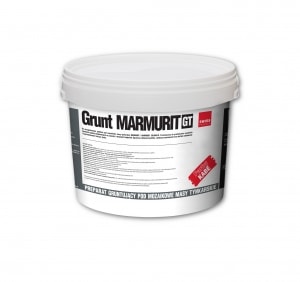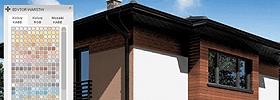MARMURIT GT

Primer for mosaic renders
Coloured product based on acrylic dispersion and mineral fillers intended for proper preparation of the substrate for MARMURIT, MARMURIT COLORATO and MARMURIT AKORD mosaic renders. It is used for priming all typical construction substrates outside and inside buildings, including in KABE THERM MARMURIT COLORATO/ MOZAIKER COLORATO* and KABE THERM MARMURIT/MOZAIKER* EWI systems. To be applied on mineral substrates (i.e. concrete, cement render, cement-lime render) and on substrates covered with well set and bound polymer-based coatings.
Note: Absorbent substrate prior to product application requires priming with BUDOGRUNT ZG primer (outside) or BUDOGRUNT WG primer (inside).
| Base binder: | copolymer binder; |
| Pigments: | organic and non-organic coloured pigments; |
| The content of volatile organic compounds VOC: | cat. A/g. The product contains less than 30 g / l VOC; |
| Colour: | white or coloured to the render colour; |
| Average coverage: | ca. 0.20 l/m² (depending on the substrate water absorbency); |
| Density: | ca. 1.4 g/cm³; |
| Solids content: | ca. 55%; |
| Temperature of application (air and substrate): | from +5°C to +25°C; |
| Relative humidity: | ≤75%; |
| Packaging: | Single-use plastic packaging of 5 and 10 l; |
| Storage: | The product should be stored in its sealed packaging in a cool, but frost-protected room. Opened packaging should be tightly closed and used as quickly as possible; |
| Shelf life: | Originally sealed products have a 12-month shelf life from the date of production (this is printed on the side of the packaging). |
• Improves the top coat adhesion
• Reduces and equalises substrate water absorbency
• Reduces the effect of substrate showing if it is coloured to the render colour
• Makes render application and texture modelling easier
• Features a very high adhesion to both mineral substrates and polymer coatings
SUBSTRATE PREPARATION: Apply to a sound/stable and clean substrate (without cracks and delaminations), degreased, even and dry, and biological or chemical efflorescence free. In case of algae/fungi growth, the substrate should
be cleaned mechanically and then wash with water and disinfect with ALGIZID. Any loose layers not bound to the substrate (i.e. loose render or flaked coatings) should be removed. Old and/or dirty substrates should be washed off and
degreased with water and CLEANFORCE cleaning agent. If there is any large unevenness to the substrate (from 5 to 15 mm), use levelling compound and then apply the whole surface with KOMBI or KOMBI HYDRO STOP base coat.
Minor unevenness (up to 5 mm) can be levelled out at once and smoothened with KOMBI or KOMBI HYDRO STOP base coat. Absorbent substrates should be primed with BUDOGRUNT ZG primer (outside) / BUDOGRUNT WG primer
(inside) before levelling compound and/or finish levelling compound application. If product is applied on new mineral substrates (such as concrete, cement render and cement-lime render), 2-week curing period is required.
PRIMING: Absorbent substrates should be primed first with BUDOGRUNT ZG primer (outside) or BUDOGRUNT WG primer (inside).
PRODUCT PREPARATION: The packaging contains a ready-to-use product. It cannot be diluted.
APPLICATION: The product should be applied on the substrate by using a paint brush or roller.
DRYING: Primer should be dry before applying a render, a curing period lasts about 24h. Protect the newly made coating against precipitation and condensation until it dries completely. Closed rooms to be ventilated after priming.
USEFUL HINTS: To be applied on dry days with temperatures above +5°C. Drying time may be longer due to low temperatures and high relative humidity. If such is the case, it is necessary to wait until the primer dries out completely before applying the render. All tools should be cleaned with water after work is completed. Application during direct exposure to sunlight or in strong winds is not recommended. To protect wet product against inclement weather conditions, scaffolding should be covered with some protective netting.


 MARMURIT GT - TDS
MARMURIT GT - TDS